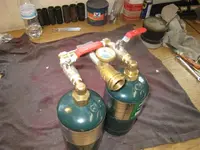LOL, omg!!! You use a link to another forum with speculators to try and prove your point. Good proof you got there. Your angle is fuel acts as a coolant in a combustion chamber. Unfortunately this is a misconceived understanding of how an internal combustion engine works. You want proof, try something like Wikipedia.
Coolant - Wikipedia, the free encyclopedia
Coolant is a heat sink. No vapor will remove heat. Only a liquid will remove heat inside an engine. The only time any fuel acts as a coolant is when it is ran through engine parts in a liquid state like a fuel rail in a jet engine or rocket. Once fuel is vaporized through whatever means, like an injector, it is a propellant, not a coolant. The fact that a lean condition creates more heat is because oxygen burns hotter and slower. More oxygen, less fuel makes for a hotter slower burn. This does not make fuel a coolant. Your understanding and terminology is flawed because of the way you are calling fuel a coolant.
Dieseling:
Dieseling - Wikipedia, the free encyclopedia
Again you misunderstand. Dieseling is caused by left over fuel or oil and a hot spot in a cylinder, not by a lean condition.
You really need to work on doing your research from reliable sources.
For your information, vehicles have been able to get more than 60 mpg since the 1950's. Many a high mileage carburetor has been designed only to have the patents bought and shelved. With modern fuel injection it is certainly possible to get 100 mpg, however the federal government doesn't want you to have that capability. Proper modern diesel engines can certainly obtain 100+ mpg and do, but not in this country. Here is just one link about 1936 technology that can obtain high mileage, that is not being used.
Today's Vehicle Can Achieve 100 MPG, Proven by Resurrected Technology From 1936 -- SALEM, Ohio, Nov. 24, 2014 /PRNewswire/ --
Another link about high mileage vehicles in the USA.
50+ MPG Cars "Not Allowed" in USA | Alternative
Now I'm not going to go search through a bunch of old patent info, but the fact is high mileage carburetor technology has been out there since the 1950's.
The fact is some high mileage vehicles are built here, but not sold here. Why? Not because of safety. It's all about money, bottom line.
I will give you the fact that propane is clean burning. Propane itself if leaked is not considered to be a pollutant. I never said it was. What I said is that when propane leaks it is a nasty fire/explosion possibility. Ever heard of a BLEVE? Propane fires often end with huge explosions. I also said propane equals a loss of power, and that it is more noticeable at higher altitudes, and this statement is true.
I don't know where you are getting your BTU facts, but here is a reliable source.
Gasoline gallon equivalent - Wikipedia, the free encyclopedia
From what I read LPG only gives you approx. 74% BTU per gallon compared to gas and diesel gives you up to 113% of BTU per gallon. Now by my calculation that is a roughly 25% drop in BTU from gasoline to propane. That is a large drop in power, and as I have said, much more noticeable at higher altitude.
I am not trying to tell you or anybody else what to do. You have formed the opinion that propane is the way you want to go. Maybe when your dredge motor hasn't got enough lift to pick up material 10 ft. deep you will understand. I just hope you don't have a fuel leak and blow your stuff up. Dennis




 ?John
?John


 s......no glory(censor would a got it anyhow) Paid $2.86 here in Redding-took both trucks and filled them to the brim as been soooooooooooooooooooooooooooooooo long since under $3. Both propane tanks full from summer as I bbq all year so no current price,was way over $4 this summer. John
s......no glory(censor would a got it anyhow) Paid $2.86 here in Redding-took both trucks and filled them to the brim as been soooooooooooooooooooooooooooooooo long since under $3. Both propane tanks full from summer as I bbq all year so no current price,was way over $4 this summer. John



